Torfaen Economy & Skills Strategy: 2021-2030
Contents
At the time of writing, the world continues to adapt to a global pandemic which is reshaping our economies at incredible speed. These changes are having a dramatic influence on our businesses, our towns, and our working habits.
It is more important than ever that we support our economy to become more resilient, more sustainable, and better placed to embrace new opportunities quickly.
This means reflecting on the changes that we have seen during the pandemic:
- People are exploring their local towns. We want to work with communities to reinvigorate our town centres as vibrant social hubs.
- People are changing how and where they work. We want to help young people achieve their ambitions in Torfaen, and support residents from all backgrounds into high quality and sustainable employment.
- People are taking the leap with new business ideas. Whether they are offering new services to our local communities, or developing cutting edge innovative products to sell overseas, we want to ensure that Torfaen continues to be a great place to start up a business.
This strategy sets a clear and achievable vision for how we can work together to deliver a successful, sustainable Torfaen economy for future generations.
Councillor Joanne Gauden
Executive Member for Economy & Regeneration
Back to top
A Successful Torfaen Economy
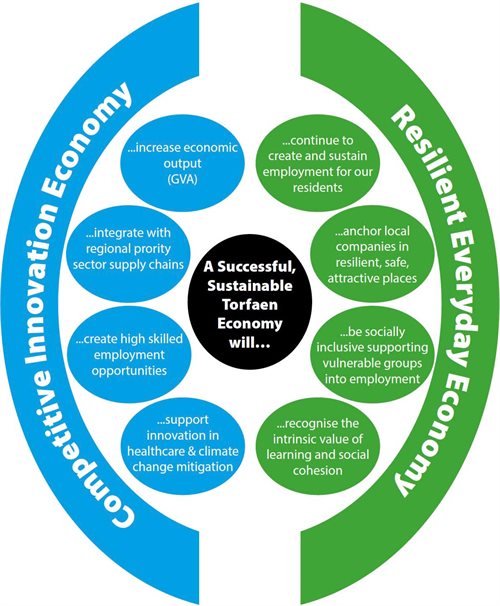 A successful, sustainable Torfaen economy is a well-balanced Torfaen economy. A Borough whose businesses are delivering economic growth, whilst helping to create thriving, safe and attractive places for shopping, trade and leisure and supporting our citizens into skilled, prosperous & secure employment.
A successful, sustainable Torfaen economy is a well-balanced Torfaen economy. A Borough whose businesses are delivering economic growth, whilst helping to create thriving, safe and attractive places for shopping, trade and leisure and supporting our citizens into skilled, prosperous & secure employment.
Sustainable and successful economies are built on a wide range of sectors providing a variety of jobs and business opportunities for a diverse population. We are fortunate to have, and to attract, a diverse mix of businesses each with their own economic ambitions & outlook. Some are at the cutting edge of innovation, international trade and high skilled employment: a competitive innovation economy. Others are providing crucial supplies and services that our residents and businesses rely on in our daily lives and are doing so locally, helping to reduce our impacts on climate change: a resilient everyday economy.
Both parts of the economy are crucial to delivering the sustainable economic outcomes that we want to see in the Borough. As such the Torfaen Economy & Skills Strategy will promote a balanced approach to economic development.
Back to top
A successful Torfaen economy will produce a sustained increase in economic output
For the Borough to remain competitive and attractive to new, innovating companies it is important that the Gross Value Added (GVA) of the economy continues to increase. There is no reliable measure for GVA at a local authority level. However, figures are often produced for the NUTS3 level which, for Torfaen, would be the Gwent Valleys. Between 1997 and 2018 overall GVA in the Gwent Valleys rose steadily. GVA per head rose to £15,536 staying consistently around 54.2% of the UK figure.
Economic Impacts
| The Economic impacts | Baseline | 2030 Target |
|---|
| Gwent Valleys GVA 1 |
£5,341M |
£6,682M |
| 3-year survival rate of businesses 2 |
55% |
60% |
| Gwent Valleys GVA per head |
54.2% of UK |
54.2% of UK |
| Employment land with planning consent 3 |
- |
24.3ha |
A successful Torfaen economy will see Torfaen’s businesses taking an active role in regional priority-sector supply chains
The Cardiff Capital Region has identified 8 regional strategic sectors based on a comparative strength where the region can compete at a UK and international level to attract investment.
- FinTech
- Cyber Security Analytics
- Compound Semiconductor
- Creative Economy
- Artificial Intelligence
- Life Sentences
- Transport Engineering
With 8% of the Torfaen workforce employed in transport engineering, 7% in ICT (fintech, cyber, AI) and 16% in human health, Torfaen’s businesses are well-placed to work closely with their counterparts in these priority sectors across the region.
Monitoring Changes in the Economy
| Monitoring Changes in the Economy | Baseline | 2030 Target |
|---|
| % residents employed in priority sectors 4 |
31% |
35% |
| % companies operating in priority sectors 5 |
17% |
25% |
A successful Torfaen economy will create high skilled employment opportunities for local residents
A successful innovation economy should encourage companies to create high skilled employment and should equip residents with the skills needed to compete for that employment. Since 2000, the proportion of residents with no qualifications has halved, the proportion with NQF Level 2+ qualifications have increased by over 10 percentage points and the proportion with Level 3+ qualifications have moved closer to the Wales average.
However, in the last few years the gap between Torfaen and the Wales average has slightly increased warranting continued emphasis as an economic priority for the Borough. We will explore opportunities to link our businesses into Further and Higher Education so that they can generate innovation-led employment opportunities.
Monitoring Changes in the Economy
| Monitoring Changes in the Economy | Baseline | 2030 Target |
|---|
| 16-64 residents with L4+ qualifications (Torfaen as a % of Wales average) 6 |
84% |
86% |
| % variance from Wales average in Gross Weekly Pay 7 |
105% |
108% |
A successful Torfaen economy will encourage business innovation in public priorities like climate change, healthcare & manufacturing productivity
Collaboration between businesses and government to find solutions to the “grand challenges” of the day is growing. It is at the heart of the UK Government’s Plan for Growth; the Welsh Government’s Economic Contract and the Cardiff Capital Region City Deal’s Challenge Funds. There is a strong national commitment to reducing the environmental impact of production and consumption and consequently, of Wales’s global environmental footprint, moving towards a circular economy.8 At the same time, innovation in these areas will benefit businesses too, helping firms become more resilient to the impact that climate change will have on their costs, operations, and markets. Businesses in Torfaen are leading innovation in some key areas:
- Modern Healthcare
- Climate (E-Mobility)
- Manufacturing Productivity
Monitoring Changes in the Economy
| Monitoring Changes in the Economy | Baseline | 2030 Target |
|---|
| Co’s accessing Innovate UK funding pa. |
0 |
2 |
| Co’s accessing Challenge Funds |
0 |
2 |
Back to top
A successful Torfaen economy will continue to create and sustain secure employment for our residents
For much of the past 5 years the claimant count has remained at historic lows of approximately 3.5%. The Covid-19 pandemic caused significant and sudden variation in the claimant count, with figures rising to 6.5% in August 2020. The claimant count has started to drop (5.3% in July 2021) but still remains higher than pre-pandemic.9 As we emerge from the pandemic, popular entry level roles are likely to be squeezed as the impacts of Covid-19 on the prospects of retail and hospitality businesses start to feed through to employment figures. The jobs market is likely to become increasingly competitive. The Strategy therefore supports activity which promotes business growth and self-employment in the everyday economy. There are opportunities emerging in the circular economy, with investment in decarbonisation. This requires strong alignment between business support and pre-employment support to help residents furthest from the labour market embrace these opportunities. The links between pre-employment support and priority-sector entry level roles will need to be strengthened.
Monitoring Changes in the Economy
| Monitoring Changes in the Economy | Baseline | 2030 Target |
|---|
| Claimant : Vacancy Ratio 10 |
15 : 1 |
13 : 1 |
| No. of Enterprises in Torfaen 11 |
2,165 |
2,500 |
| 16-64 residents with L2+ qualifications (Torfaen as a % of Wales average) 6 |
96% |
98% |
| EA rate (Torfaen as % of Wales average) 12 |
98% |
100% |
A successful Torfaen economy will be socially inclusive supporting vulnerable groups into employment
As we emerge from Covid-19 it is important that our most vulnerable residents are not “left behind” as the jobs market tightens. Factors like age (particularly those at risk of NEET), ill-health (with 37.8%. of economically inactive declaring long-term sickness) and place-based deprivation (3 of 60 LSOAs are in the bottom 10% on the WIMD) all impact on how easy it is for residents to gain skills or employment.
Monitoring Changes in the Economy
| Monitoring Changes in the Economy | Baseline | 2030 Target |
|---|
| % of NEET Young People (Yr 11) 13 |
2.3% |
1.4% |
| % of 16 YO with unknown destination 14 |
0.6% |
0% |
|
EA rate (Torfaen as % of Wales average): 15
- Male
- Female
- Disability & ill-health
|
99%
97%
95%
|
101%
100%
100%
|
| Employment rate amongst ethnic minority groups 16 |
133% |
133% |
A successful Torfaen economy will create resilient, safe and attractive places which attract and anchor local companies
With three very different towns and two industrial landscapes (including a World Heritage Site), Torfaen has many attractive places for local entrepreneurs who might be looking to cater for the day-to-day needs of residents and visitors. These places should be the focal point for everyday economic activity, including local shopping, health services, hospitality, and local production. We want to cultivate and nurture lasting relationships between our places, our entrepreneurs, and our communities, working together to make sure that we have the right mix of premises for everything that our communities want to access locally.
Monitoring Changes in the Economy
| Monitoring Changes in the Economy | Baseline | 2030 Target |
|---|
| Improved customer perceptions of places |
- |
5% |
| 3-year business survival rate (town centre) 2 |
55% |
60% |
| Diverse business profile for each town 17 |
- |
No single sector >50% |
A successful Torfaen economy will recognise the role of wellbeing advice & guidance in encouraging social inclusion
Whether through libraries programmes, one-to-one mentoring, health & wellbeing support, or life style and leisure activities, Torfaen offers a range of advice and guidance services which can help to strengthen community cohesion, promote inclusion and encourage residents to engage in further learning, or employment.
Monitoring Changes in the Economy
| Monitoring Changes in the Economy | Baseline | 2030 Target |
|---|
| Improved recognition of libraries as places that support community wellbeing |
- |
5% increase |
Back to top
People
POPULATION: The ONS estimates that 94,000 people live in Torfaen
EMPLOYMENT: There are approximately 43,400 residents of working age in Torfaen. Of these:
- 37,000 are employees
- 4,400 are self-employed
- 2,000 are estimated as unemployed
COMMUTING: Prior to Covid-19:
- 21,300 residents stayed in Torfaen to work
- 19,500 commuted out
- 14,100 people from elsewhere commuted in
EMPLOYMENT BY SECTOR
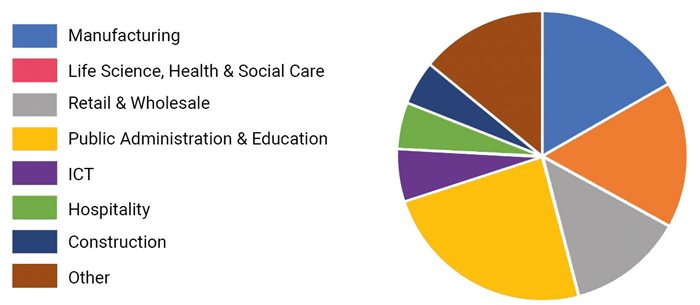
SKILLS
Skills
| Skills | No. | % |
|---|
| No Qualifications |
4,900 |
8.8 |
| NQF Level 2+ |
38,400 |
69.0 |
| NQF Level 3+ |
27,700 |
49.7 |
APPRENTICESHIPS: Over 1,725 Torfaen residents are registered as apprentices with 67% on programmes at Level 3+. Plus over 300 16-18-year-old trainees in Torfaen.
YOUNG PEOPLE’S DESTINATIONS: 97.3% of 2019 year-11s progressed into employment or further learning with just 2.1% NEET and 0.4% unknown. 56% of 2019 year. 13s went into higher education with just 4% NEET
EMPLOYABILITY: Over 5,000 employability clients secured qualifications. 1,500 have progressed into jobs.
ADULT LEARNING: Over 1,000 learners were enrolled on over 120 courses in 2019/20.
LIBRARY LEARNING: Over 150 residents supported with health & wellbeing advice and a 95% satisfaction rate from our ‘Libraries @ Home’ customers
Place
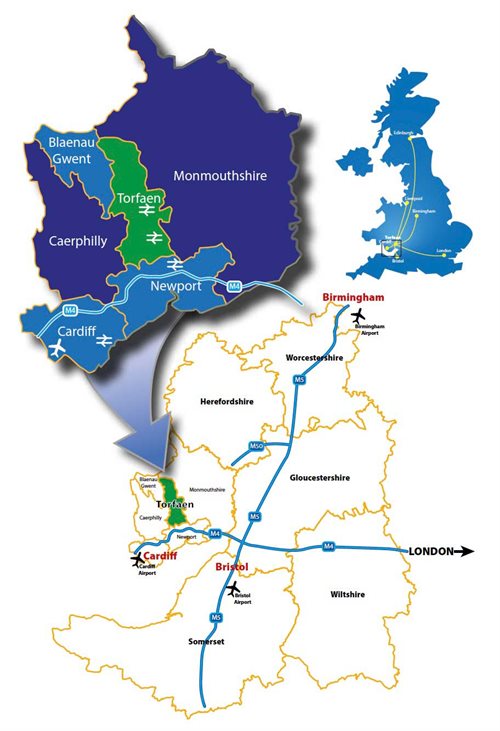 WELL CONNECTED: Torfaen offers excellent access to Welsh & UK Markets. Via the M4 it is just 30 minutes from Bristol and Cardiff, 90 minutes from Birmingham (via the M5/M50) and 2 hours from London. Good rail access to major cities is available with stations at Cwmbran, and Newport (10 minutes to the south of Torfaen). There is easy access to international airports at Cardiff, Bristol and Birmingham.
WELL CONNECTED: Torfaen offers excellent access to Welsh & UK Markets. Via the M4 it is just 30 minutes from Bristol and Cardiff, 90 minutes from Birmingham (via the M5/M50) and 2 hours from London. Good rail access to major cities is available with stations at Cwmbran, and Newport (10 minutes to the south of Torfaen). There is easy access to international airports at Cardiff, Bristol and Birmingham.
CWMBRAN is the largest town in the Borough. Its employment base is evenly distributed with significant manufacturing, healthcare & retail employment. The town includes a major critical care hospital, a regional shopping centre, 8 well-located industrial estates and a large, modern business park at Llantarnam
PONTYPOOL is the administrative centre in the Borough. Its employment base is heavily weighted towards public administration & healthcare, reflecting the presence of healthcare at Mamhilad Park industrial estate. There are 8 well-connected industrial estates to the north, south & east of the town
BLAENAVON is famous as a World Heritage Site based on its historic industrial landscape. Even today the employment base is still heavily weighted towards manufacturing, with 2 major industrial estates. The large proportion of ICT jobs reflect the presence of the Shared Resource Services Data Centre.
THE BRITISH: A strategic regeneration area in Abersychan, “the British” ironworks site contains 1300 acres of undeveloped land with huge potential for foundational economy entrepreneurship
Business
BUSINESS NUMBERS: There are 2,165 businesses operating in Torfaen in 2020. That is 20.6% more than in 2010.
BUSINESS COMPOSITION: over 1,865 of Torfaen’s businesses are micro-companies. There are also now 45 medium sized companies in the Borough – 50% higher than in 2010 and well above the Welsh and UK averages. There are 10 large, established companies.
BUSINESS BIRTH & DEATH RATE: Stats Wales data indicates that since 2013 there has been an average of 275 Business Births per annum and an average of 227 business deaths per annum.
BUSINESS SURVIVAL RATES: The latest survival rates show that over 93% of businesses survive their first year; 55% into year 3; and 39% into year 5.
££
PAY: Gross weekly pay in Torfaen has tracked the Wales average for the past 15 years. In 2020 gross weekly pay stood at £572 compared to the Wales average of £537.
COMPANIES BY SECTOR: Torfaen’s business base is strong in some key priority sectors including ICT, Advanced Manufacturing and Construction. Foundational economic sectors like healthcare and hospitality also feature strongly. Retail is particularly prominent and this will present an ongoing challenge during this Strategy period as the industry continues to restructure.
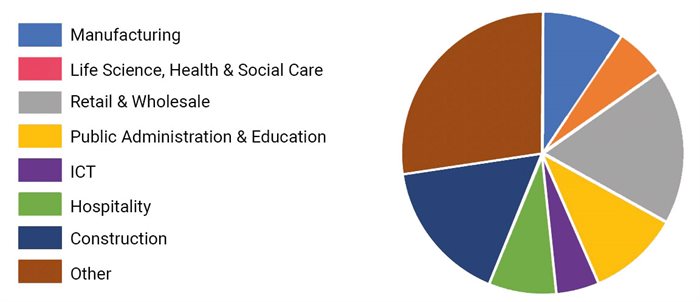
5% of all businesses are in the professional, scientific and technical sector.
OCCUPATIONS: Since 2018, the proportion of Torfaen residents employed in Managerial, Professional or Technical roles has grown to 40.8%, up from 33% in 2010. Skilled trades – at 12.5% of the workforce – are now significantly higher than the Welsh average.
Back to top
The Council ’s Economic Investment Priorities
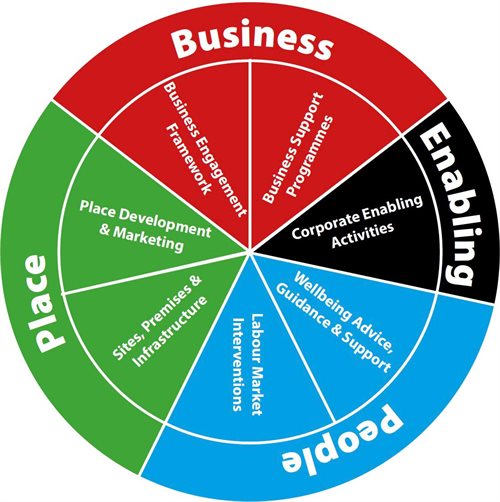 The Local Authority is a critical driver of the changes needed to deliver economic success. It is the strategic leader. It is an enabler. It is an investor and service deliverer. To deliver this strategy, the Council will prioritise its economy and skills resources at the following interventions:
The Local Authority is a critical driver of the changes needed to deliver economic success. It is the strategic leader. It is an enabler. It is an investor and service deliverer. To deliver this strategy, the Council will prioritise its economy and skills resources at the following interventions:
ENABLING
- Using procurement, assets and data smartly to create opportunities for local businesses
PEOPLE
- Coordinating & delivering a range of labour market interventions to help residents into sustainable employment
- Providing advice, guidance and support to improve residents’ employability and strengthen general wellbeing
BUSINESS
- Making it simpler for businesses, and business forums, to work with the Council’s support services, project managers and regulatory teams
- Coordinating & delivering business support programmes specifically for (a) the everyday economy, and (b) the innovation ecosystem
PLACE
- Producing & promoting an Investment Prospectus to secure public and private investment in key sites, premises and infrastructure
- Helping our communities establish a clear sense of place, and attract entrepreneurs and businesses in the everyday economy
Back to top
Key Principles for our Investment in Enabling
- Council-wide: Our enabling work covers activity across the suite of Council services
- Partnership: We will work with Public Service Board partners to expand these principles beyond the Council
The Council and its PSB partners are the largest employers in Torfaen, hold the greatest number of assets and have significant spending power. These are powerful levers that can be used to help business deliver economic change.
Procurement Strategy: We will work with our PSB partners to support our local businesses to engage with the public sector supply chains for both revenue and capital activity. This creates opportunity for local growth whilst minimising the impact of our procurement on the environment. Emerging investment in the decarbonisation of housing & the public estate, and in the development of local food production, are both opportunities to trial this approach.
Asset Management Strategy: The Local Authority and other Public Sector bodies have large numbers of staff who, if in the right place, can help to drive spend in local economies. More directly, some of our assets also host businesses – either through our industrial stock, our test trading venues (Pontypool Indoor Market / Llanyrafon Manor) or our innovation & soft-landing venues (Springboard Innovation Centre).
Public Service Work Experience & Training Programmes: The Local Authority and other Public Sector bodies are able to offer training and work experience opportunities to young people. There are opportunities to develop & target a programme at vulnerable groups.
Targeted Recruitment & Training: We will work with procuring departments to increase the targeted recruitment and training of local people via our employability projects as a result of our procured activities.
Back to top
Key Principles for our Investment in People
- Regional: Our programmes will align with the objectives of the Regional Skills Partnership
- Personalised: Employability will focus on individuals’ barriers as well as opportunities in the labour market.
- Demand-led: We will work with business and use labour market intelligence when designing our provision
- Co-Funded: We will work collaboratively to access funding to allow us to continue delivering this crucial work
Labour Market Interventions
Delivering employability support to help those furthest from the labour market access job opportunities by providing intensive and personalised support to enable residents to overcome their barriers to employment.
Our employability programmes will also support the most vulnerable within the labour market to sustain secure employment with fair levels of pay and to progress at work.
The Regional Skills Partnership aim is to increase the number of Level 3+ technical qualifications so that the regional workforce can embrace future jobs. To support this, our employability programmes will place more emphasis on pathways into starter roles in our priority sectors.
Helping adults to gain essential skills through our adult and community learning franchise. We will continue to work closely with Welsh Government and Coleg Gwent to increase the number of adults taking GCSEs, numeracy, literacy, digital literacy, ESOL and ILS courses.
Supporting all-age apprenticeships and other forms of work-based learning. Vocational skills are critical to the success of our key sectors including manufacturing, hospitality, construction & human foundational economy. Similarly, our green infrastructure aspiration to create functional, connected natural areas offers opportunities for improving vocational skills. The Council will proactively work with work-based learning providers and the PSB to present a clear, coordinated Torfaen offer to applicants which meets labour market demand and fulfils our businesses’ & partners’ needs.
Raising young peoples’ aspirations and promoting local careers. Torfaen’s businesses are at the cutting edge of innovation in e-mobility, life science and fin-tech. However too many of our young people do not progress into local careers or consider setting up a local business. We will work closely with the Torfaen Strategic Economic Forum, our local education providers & graduates to raise awareness of and aspiration for local careers, map pathways into those careers and work with employers to deliver opportunities for local young people.
Supporting youth engagement and progression through early identification, extensive tracking, personalised one-on-one and group support for 11.16-year olds at risk of becoming NEET and tracking & targeted employability & mentoring support for 16-24-year olds who have become NEET.
Wellbeing Advice, Guidance & Support
Many of the Council’s premises like its libraries and ACL centres provide a safe haven for people who are looking to build their social networks and meet other people. Through a range of advisory services and lifestyle courses, these premises help to establish the intrinsic social benefits of shared learning and act as a gateway to future skills development.
Providing a wellbeing advisory service through our library network in collaboration with our PSB partners. This service will work with health bodies, charities and community groups to promote healthy messages and to provide signposting and guidance for those with long-term health conditions.
Aligning with the Torfaen Libraries Strategy to offer welcoming safe spaces that inspire young people and their families to develop their knowledge, interest & skills. Our libraries and Adult Learning Centres will become the first port-of-call for a wide range of customer and community services, job clubs, and employability programmes.
Offering a wide curriculum of lifestyle & leisure courses and clubs. Lifestyle & leisure courses play a valuable role in promoting the benefits, value and sense of achievement from learning and help our residents to improve confidence, social networks and mental health. We will continue to grow our extensive range of full-cost courses in areas such as arts, crafts, languages and family history. We will continue to develop a curriculum which is exciting, engaging and rewarding.
Our investment in labour market interventions & wellbeing advice, guidance & support will help us achieve:
- Objective 3: A successful Torfaen economy will create high skilled employment opportunities for local residents
- Objective 5: A successful Torfaen economy will continue to create and sustain secure employment for our residents
- Objective 6: A successful Torfaen economy will be socially inclusive supporting vulnerable groups into employment
- Objective 8: A successful Torfaen economy will recognise the role of wellbeing advice & guidance in encouraging social inclusion
Back to top
Principles for our Investment in Place
- Community-led: We should strive for a shared vision with residents, entrepreneurs and landowners
- End-use Led: Our starting point should be the activity that we want to see and not “the building”
- Investable: The vision requires funding to deliver. Proposals must be investable by the public/private sector
- Holistic: Investments should complement wider activities across the Council & partners
Place Development & Marketing
Coordinating the Blaenavon Industrial Landscape World Heritage Site Partnership so that the landscape is well cared for, and so that the outstanding universal contribution South Wales made to the Industrial Revolution is well presented and understood by the local community and visitors. As the World Heritage Site coordinator, we will oversee the Management Plan and will play an active role in the partnership to promote the themes of exploration, enjoyment & learning
Coordinating activity on the Monmouthshire & Brecon Canal, developing a Canal strategy which establishes a clear future role for the canal as a vital community asset, ecological corridor, and leisure route. As well as community engagement, we will explore funding opportunities for the longer-term development of the canal.
Strengthening biodiversity and the natural and historic environment at the British Ironworks by seeking delivery partners for elements of the site Masterplan. We will work closely with the community to ensure projects are aligned with our vision for a sustainable community set in a dramatic natural landscape (including resilient uplands) with a wealth of historic character.
Producing Place Plans collaboratively with entrepreneurs, landowners, and communities to redesign our towns as vibrant, safe and clean hubs for people’s everyday needs. We will help local people find the skills & ambition to ‘try out’ a business idea in our towns. We will support with premises & market research with the aim of filling the gaps in our local economy. But we will also reflect the changing use of our towns with an emphasis on shared & outdoor social space for a post-Covid working environment.
Sites, Premises & Infrastructure
Producing an Investment Prospectus for Torfaen which presents the sites, premises and infrastructure needed to improve productivity in the Borough. This will include major transport investment priorities, priority (re)development sites and key premises, particularly those aligned to our Place Plans. We will advertise the prospectus to prospective developer, entrepreneur and business partners. The prospectus should drive project selection & prioritisation based on investor interest and economic impact and will use this as the basis for seeking investment.
Aligning our infrastructure investment bids with economic need. Each year, regional authorities bid for funding to improve local infrastructure. Depending on available schemes, this may be highways improvements, public realm & active travel, digital, green infrastructure, or flood risk mitigation. As well as providing active travel routes for company staff, these projects also provide construction tender opportunities for local companies. We will involve the Strategic Economic Forum in the process of selecting investment proposals before they are submitted for funding.
Promoting the refurbishment and establishment of new industrial land in Torfaen by working in partnership with the Council’s Planning Department to attract developer interest. Industrial sites will form part of the Investment Prospectus and as such where there is developer interest we will work with landowners and public / private investors to seek investment in the (re) development of the site.
Establish a flagship Innovation Campus around the Grange University Hospital. The Grange University Hospital is a Specialist and Critical Care hospital built in 2020 in Llanfrechfa. Working collaboratively with Welsh Government, the NHS, Aneurin Bevan University Health Board, regional universities and Life Science Industry Bodies we aim to create a 19,000sqft Medi Park bringing new, high value life science jobs to the Borough. 22
Our investment in place development and in sites, premises & infrastructure will help us achieve:
- Objective 1: A successful Torfaen economy will create a sustained increase in economic output
- Objective 3: A successful Torfaen economy will create high skilled employment for local residents
- Objective 4: A successful Torfaen economy will encourage business innovation in public priorities like climate change, healthcare & manufacturing productivity
- Objective 5: A successful Torfaen economy will continue to create and sustain secure employment for our residents
- Objective 7: A successful Torfaen economy will create resilient, safe and attractive places which attract and anchor local companies
Back to top
Key Principles for our Investment in Business
- Collaboration: We want to design our support programmes in consultation with business
- Subsidiarity: Certain business support programmes are better delivered at the local level, others regionally or nationally. We will work with partners to deliver the right intervention at the right level
- Local Enterprise: We want to support local companies and entrepreneurs to locate & remain in Torfaen
Business Engagement Framework
Torfaen businesses engage with the Council daily, whether accessing business support, working with regulatory services, using trade waste, or occupying Council premises.
By adopting a new “One Stop Shop” business engagement framework, we will redefine how the Council manages these interactions, using a modern CRM system, tracking enquiries across the Council and coordinating responses to streamline the number of officers that a business needs to engage with.
Business Support Programmes
Supporting Productivity and Innovation. We want to attract and support businesses who innovate, supporting product development particularly where those products achieve wider strategic policy objectives. We will encourage Torfaen businesses to engage in regional innovation programmes & challenge funds. Working collaboratively with Welsh Government, we will offer a productivity enhancement programme to support product and process development for local businesses.
Foundational Business Support: We want to support residents who understand and love where they live to “take the leap” into business and to help fledgling businesses thrive. Many potential entrepreneurs will have an idea for a product / service that meets the needs of local consumers but may lack the confidence, peer support, mentoring, networks or low risk premises to turn this into a business. We will provide a wrap-around business support programme for foundational economy entrepreneurs, with a particular emphasis on helping businesses establish in lower-cost small units in our town centres.
Creating an Innovation Ecosystem, through a network of innovation spaces. Starting with the Springboard Innovation Centre, we aim to expand our network of innovation spaces and R&D partners, working collaboratively with the Torfaen Strategic Economic Forum. The Grange University Hospital campus creates an excellent opportunity to grow the ecosystem.
Our investment in business engagement and support will help us to achieve:
- Objective 1-8: All strategic objectives linked to the creating a competitive innovation economy and supporting a resilient everyday economy
Back to top
“A successful Torfaen economy will create public/private/third sector partnerships to sustain growth and skills”
Achieving strategic economic change in Torfaen requires a broad coalition of partners acting with a common purpose towards a shared vision for the future economy of Torfaen. This includes our business community, further education and work-based learning providers, higher education institutions, registered social landlords, third sector organisations and community groups, our town and community councils, and the wider public sector operating in Torfaen.
Complementing Delivery
We want to ensure integration between this strategy and those of our partners
Torfaen Strategic Economic Forum
The Forum is a group of local businesses who are passionate about creating long-term prosperity. We will work with the forum on their strategic objectives of improving transport connectivity, procurement processes and skills
Cultural Organisations
Several cultural organisations provide quality, educational services which complement this strategy, including Blaenavon Workmen’s Hall, Llantarnam Grange, Congress Theatre, Torfaen Museum & Blaenavon Community Museum
Collaborating on Delivery
We want to strengthen our collaborative delivery over the course of this strategy:
Blaenavon World Heritage Site Partnership
The 4 Councils, National Park Authority, Canal & Rivers Trust, Welsh Government and the Royal Commission on Ancient & Historic Monuments in Wales are collectively responsible for the delivery of the 3 Management Plan themes.
Positive Pathways & Keeping in Touch Groups
The Council, Llamau, Housing Associations, Coleg Gwent, DWP and Training Providers work collectively on youth engagement & progression
Torfaen Economic Inactivity & Welfare Reform Project Groups
The Council, Housing Associations, DWP, Citizens Advice Bureau, Disability Advice Project, and Garnsychan Partnership work together on advice, signposting and support to reduce the levels and impact of poverty in the Borough.
Co-funding Delivery
This strategy will require external sources of funding. We want to work collaboratively with our partners to maintain this provision
A Regional Employability Service
We will continue to work with Local Authorities across the Cardiff Capital Region to seek replacement funding for our youth engagement and employability activities post-EU funding.
The Gwent ACL Franchise
Torfaen are members of the Gwent ACL partnership. Managed by Coleg Gwent, the partnership’s franchise ensures wide-reaching and high-quality learning in our communities
Back to top
We will work with the PSB to extend the ‘enabling’ activities across Torfaen including procurement activity, careers programmes & asset management. We will also work collaboratively with PSB partners and partners in Further Education to support delivery of the Wellbeing objectives.
Snapshot: Training and Apprenticeships
Objective 6 of the Wellbeing Plan seeks to improve local skills through work-force planning, training, apprenticeships & volunteering.
The PSB officer support group will map gaps in training provision locally and will engage with local further education providers to provide innovative solutions to these skills gaps. These include:
Engineering Skills
We will seek to build on the successful pilot between the Council, the Torfaen Voluntary Alliance, Torfaen Strategic Economic Forum and Coleg Gwent to provide a training ecosystem where our small engineering firms develop and share training expertise.
Decarbonisation Skills
We will seek to work with RSL partners and Coleg Gwent to identify and address skills gaps in anticipation of the rollout of the Optimised Retrofit Programme.
Shared Construction Apprenticeships
We will seek to seek to work with the apprenticeship network and Y Prentis to expand the shared construction apprenticeship programme.
Public Sector Apprenticeships
We will seek to work with all PSB partners to identify a collaborative way of increasing recruitment into apprentice roles within the public sector.
Back to top
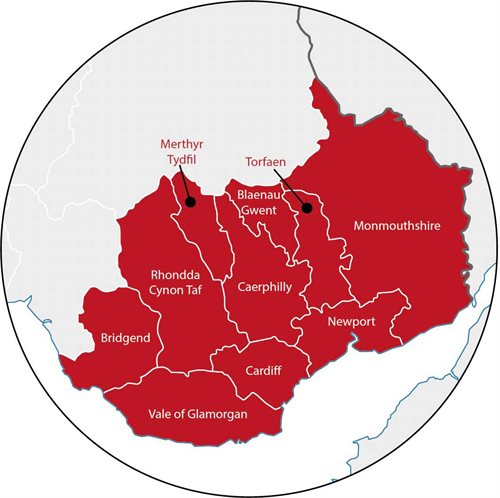 The Cardiff Capital Region covers 10 local authority areas stretching from the English border in the east to Bridgend in the West and from the coastal counties in the South to the Heads of the Valleys in the north. Collectively it contains over 1.5 million people and includes 2 cities, market towns, rural communities and south Wales industrial heartlands.
The Cardiff Capital Region covers 10 local authority areas stretching from the English border in the east to Bridgend in the West and from the coastal counties in the South to the Heads of the Valleys in the north. Collectively it contains over 1.5 million people and includes 2 cities, market towns, rural communities and south Wales industrial heartlands.
The regional economy accounts for approximately 50% of the total GVA of Wales and is home to over 50,000 local businesses which provide employment opportunities for the 19,500 Torfaen residents who commute out of the Borough for work.
With the passing of the Corporate Joint Committees Regulations in 2021, the Cardiff Capital Region will play an important role in complementing the economic interventions at a local level. It is envisaged that the CJC will provide complementary investment in areas like:
- Metro Plus Transport Investment
- Strategic Development Plan
- Business Innovation Programmes
- Investment Funds
- Policy-based Challenge Funds
- Inward Investment & Promotion
- Higher Education Engagement
- Clusters Strategy
Back to top
In a fast-changing and uncertain economic landscape, it is imperative that the impact of the strategy is continually monitored and scrutinised regularly. The governance structures are set out below
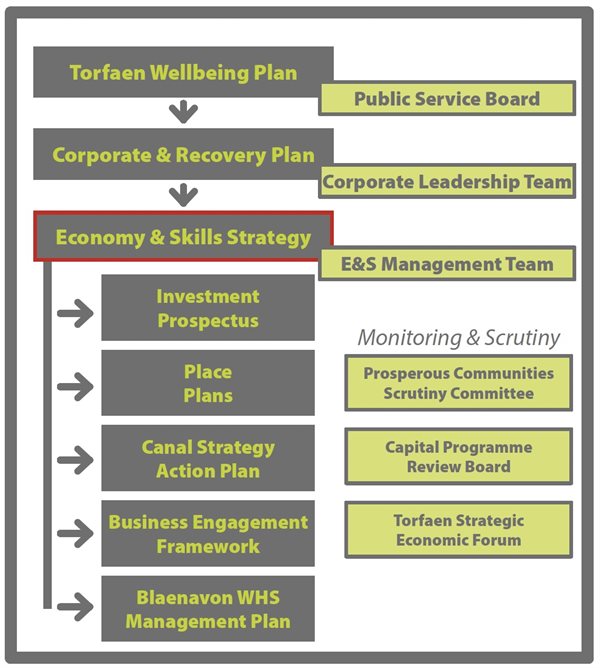
Annual Monitoring Report
The impact of the strategy on the high-level economic indicators will be tracked annually and reported through the Council executive reporting processes.
Policy Alignment
As a corporate policy, the Economy & Skills Strategy will align with other corporate strategies including:
- The Corporate Recovery Plan
- The Council’s Wellbeing Objectives
- The Asset Management Strategy
- The Local Development Plan
- Local Housing Market Assessment
- Regional and Local Transport Strategies
- The Green Infrastructure Strategy
Back to top
- ACL: Adult & Community Learning
- AI: Artificial Intelligence
- CC: Claimant Count: An official statistic used to illustrate the number of people within the Borough claiming unemployment related benefits
- CCR: Cardiff City Region
- CRM: Customer Relationship Management System
- EA: Economically Active: An official statistic used to illustrate people who are in employment. Its counterpart – economically inactive – includes all of those residents who are not in or seeking employment
- ESOL: English for Speakers of Other Languages
- GVA: Gross Value Added: An official statistic for demonstrating economic growth and/or productivity.
- ILS: Independent Living Skills
- LDP: Local Development Plan
- LSOA: Local Super Output Area: A statistical area at a very local level – smaller than a town
- NEET: Not in Employment, Education or Training
- NQF: National Qualifications Framework: A national system for comparing different types of academic & vocational qualifications.
- NUTS3: A statistical area larger than a local authority but smaller than the region. In Torfaen’s case: Gwent Valleys
- TSEF: Torfaen Strategic Economic Forum: A forum comprising larger businesses in Torfaen seeking to improve the economic prospects of the borough
- ONS: Office of National Statistics
- PSB: Public Service Board
- R&D: Research & Development
- RDP: Rural Development Programme
- RSL: Registered Social Landlord
- RSP: Regional Skills Partnership
- WHS: The Blaenavon Industrial Landscape World Heritage Site
- WIMD: Wales Index of Multiple Deprivation
- Micro-Business: A business with 0-9 employees
- Small Business: A business with 10-49 employees
- Medium Business: A business with 50-249 employees
- Large Business: A business with 250+ employees
Back to top
- Data from the ONS GVA Bulletin: https://www.ons.gov.uk/economy/grossvalueaddedgva/bulletins/regionalgros svalueaddedbalanceduk/1998to2017#interactive-map-gross-value-added-gva.per-head-for-nuts3-local-areas-1998-to-2017
- 18 ONS business demography data. 1-year, 3-year and 5-year survival rate figures available at: https://www.ons.gov.uk/businessindustryandtrade/business/ activitysizeandlocation/datasets/businessdemographyreferencetable
- The 2018-2033 LDP is still in development. The target is based on the undelivered employment land allocations within the 2013-2021 Local Development Plan which are anticipated to carry forward into the 2018-2033 LDP.
- This measure will be subject to annual review to confirm that the priority sectors still represent the most appropriate sectors for Torfaen and the City Region. Data is based on ONS employment statistics for the priority sectors
- 2-digit Standard Industrial Code (SIC) at a local authority level from the annual business demography survey available from https://www.nomisweb.co.uk/datasets/idbrlu
SIC Codes used as a proxy for priority sectors are: 20, 21, 22, 25, 26, 28, 29, 30, 58, 59, 60, 61, 62, 63, 64, 65, 66, 71, 74, 90, 91, 93. SIC code descriptions are available at https://webarchive.nationalarchives.gov.uk/ukgwa/20160105160709/, http:// www.ons.gov.uk/ons/guide-method/classifications/current-standard.classifications/standard-industrial-classification/sic2007---explanatory-notes.pdf
- ONS Working age (16-64) qualification data from the annual population survey. Shows the Torfaen figure expressed as a % of the Wales figure. Baseline is average over 3 years (2018, 2019, 2020) to reduce the impact of single year anomalies. Figures from: https://www.nomisweb.co.uk/reports/lmp/la/1946157402/subreports/quals_ time_series/report.aspx?
- Average weekly pay data from the ONS annual survey of hours and earning. Shows the Torfaen figure expressed as a % of the Wales figure. The baseline is average over 3 years (2018, 2019, 2020) to reduce the impact of single year anomalies. https://www.nomisweb.co.uk/reports/lmp/la/1946157402/report. aspx?town=Torfaen#tabempunemp
Figures relate to the wages of Torfaen residents rather than to those employed in workplaces in Torfaen. Figures for the latter available from: Average (median) gross weekly earnings by Welsh local areas and year (£) (gov. wales)
- This reflects the 2020 NRW State of Natural Resources Report and the Council’s Climate Change Emergency declaration.
- Claimant Count data from the ONS monthly bulletin on employment and labour markets: https://www.nomisweb.co.uk/reports/lmp/la/1946157402/report. aspx?town=Torfaen#tabwab
- This measure is dependent on the continued publication of vacancy statistics by Data Cymru.
- Number of Torfaen enterprises (rather than local units). Sourced from ONS Inter.departmental business register statistics. Figures available at: https://www.nomisweb.co.uk/reports/lmp/la/1946157402/report. aspx?town=Torfaen#tabwab Note baseline figure is January 2020 and so does not reflect impact of Covid 19. Target to be reviewed at the end of year 1 of the strategy.
- ONS Economically Active Rate from the annual population survey. Shows the Torfaen figure expressed as a % of the Wales figure. Baseline figures are the 3-year average (Dec 2018, Dec 2019, Dec 2020) to reduce impact of single year anomalies. This is subject to the current definition of Economic Activity which is currently based on 16-64. If the ONS changes this to reflect recent increases in the retirement age then this target will need to be updated accordingly. Figures available at: https://www.nomisweb.co.uk/reports/lmp/la/1946157402/report. aspx?town=Torfaen#tabempunemp
- Careers Wales Annual Destinations Survey for Year 11 students. Category: “Known not to be in Education, Training or Employment”. Figures available at: https://careerswales.gov.wales/careers-professionals/pupil-destinations
- Careers Wales Annual Destinations Survey for Year 11 students. Category: “No Response to Survey”. Figures available at: https://careerswales.gov.wales/careers-professionals/pupil-destinations
- ONS Economic Activity rate by population and gender from the Annual Population Survey https://www.nomisweb.co.uk/reports/lmp/la/1946157402/report. aspx?town=Torfaen#tabempunemp).
EA rate for disability and ill health requires query of the APS https://www.nomisweb.co.uk/datasets/apsnew
using dataset T02a:4 (EA Core (current disability) or work limiting disabled – Economically Active) as a % of T02a:1 (EA Core (current disability) or work limiting disabled – All people). All data shows the Torfaen figure expressed as a % of the Wales figure. Baseline figures are the 3-year average (Jan-Dec 2018, 2019, 2020) to reduce impact of single year anomalies.
- Employment rate for ethnic minority communities requires query of the APS https://www.nomisweb.co.uk/datasets/apsnew for all Welsh counties using dataset “aged 16-64 employment rate – ethnic minority”. All data shows the Torfaen figure expressed as a % of the Wales figure. Baseline figures are the 3-year average (Jan-Dec 2018, 2019, 2020) to reduce impact of single year anomalies.
- Town profiles available at: www.understandingwelshplaces.wales/en/map
Last Modified: 14/09/2025
Back to top